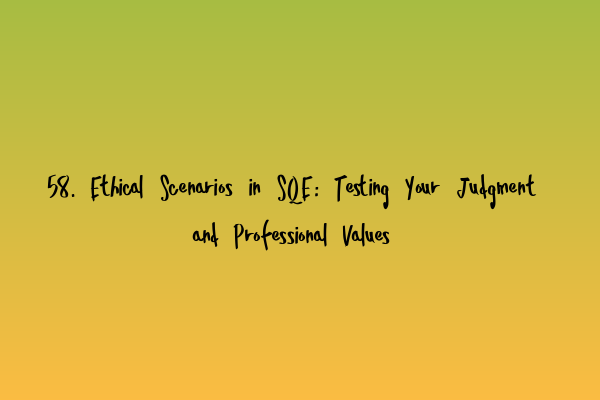58. Ethical Scenarios in SQE: Testing Your Judgment and Professional Values
As you prepare for the Solicitors Qualifying Examination (SQE), it’s crucial to not only have a solid understanding of legal principles and concepts but also to develop your judgment and professional values. The SQE is designed to assess not just your legal knowledge but also your ability to make ethical decisions in various scenarios that lawyers often encounter.
In this article, we will discuss the importance of ethical scenarios in the SQE and how they test your judgment and professional values. We will also provide some tips on how to effectively approach and excel in these scenarios. So, let’s dive in!
Understanding the Significance of Ethical Scenarios in the SQE
Lawyers are not just legal experts; they are also trusted advisors and representatives of their clients. The SQE recognizes this dual role and aims to assess your ability to act ethically and make sound judgments to protect the interests of clients, the legal profession, and society as a whole.
Ethical scenarios in the SQE are designed to present you with realistic situations that lawyers commonly face. These scenarios may involve conflicts of interest, confidentiality issues, dilemmas related to client representation, or decisions about professional conduct. By testing your responses to these scenarios, the SQE evaluates your ability to recognize and navigate ethical challenges, demonstrating your commitment to upholding professional values.
Tips for Excelling in Ethical Scenarios
While ethical scenarios can be challenging, with the right approach and preparation, you can perform exceptionally well. Here are some tips to help you excel in this aspect of the SQE:
1. Familiarize yourself with professional codes of conduct:
It’s crucial to have a thorough understanding of the professional codes of conduct that govern the legal profession. Familiarize yourself with the Solicitors Regulation Authority (SRA) Code of Conduct and the Bar Standards Board (BSB) Handbook as they provide guidance on ethical behavior and professional standards for solicitors and barristers, respectively. These documents will serve as key references during your preparation.
2. Develop a systematic approach:
When facing an ethical scenario in the SQE, it’s essential to have a systematic approach to analyze the situation and identify the relevant legal and ethical principles. Take your time to read and understand the scenario, identify any conflicts or issues, and consider the potential consequences of different courses of action.
3. Consider the interests of different stakeholders:
Ethical scenarios often involve multiple stakeholders, such as clients, colleagues, and the wider public. Consider the interests and potential impact on each stakeholder before making a decision. Balancing these interests and ensuring fairness is a key element of ethical decision-making.
4. Apply legal and ethical principles:
Use your knowledge of legal and ethical principles to guide your decision-making process. Consider any relevant legislation, case law, and professional codes of conduct when evaluating the scenario and determining the appropriate course of action. Justify your decisions based on these principles to demonstrate your understanding of legal and ethical responsibilities.
5. Reflect on your own values and biases:
Self-reflection plays a crucial role in ethical decision-making. Be aware of your own values, biases, and potential conflicts of interest that may influence your judgment. Consider how your decision aligns with your ethical values and responsibilities as a legal professional.
6. Practice, practice, and practice:
One of the best ways to improve your performance in ethical scenarios is through practice. Take advantage of SQE 1 practice exam questions and SQE 1 practice mocks FLK1 and FLK2 to familiarize yourself with the types of scenarios you may encounter. By practicing regularly, you can develop your ability to analyze, evaluate, and respond to ethical dilemmas effectively.
To gain comprehensive knowledge and practice for the SQE, it’s highly recommended to enroll in SQE 1 preparation courses and SQE 2 preparation courses. These courses provide structured guidance, teaching materials, and expert support to enhance your overall preparation.
Final Thoughts
The ethical scenarios in the SQE are not meant to trick or undermine your abilities. Instead, they are designed to evaluate your ethical judgment, integrity, and commitment to professional values. By taking a systematic approach, relying on legal and ethical principles, and practicing diligently, you can excel in tackling these scenarios and demonstrate that you are not just a legal expert but also an ethical and responsible legal professional.
For more information on SQE preparation, SQE exam dates, and other helpful resources, please visit the following articles:
